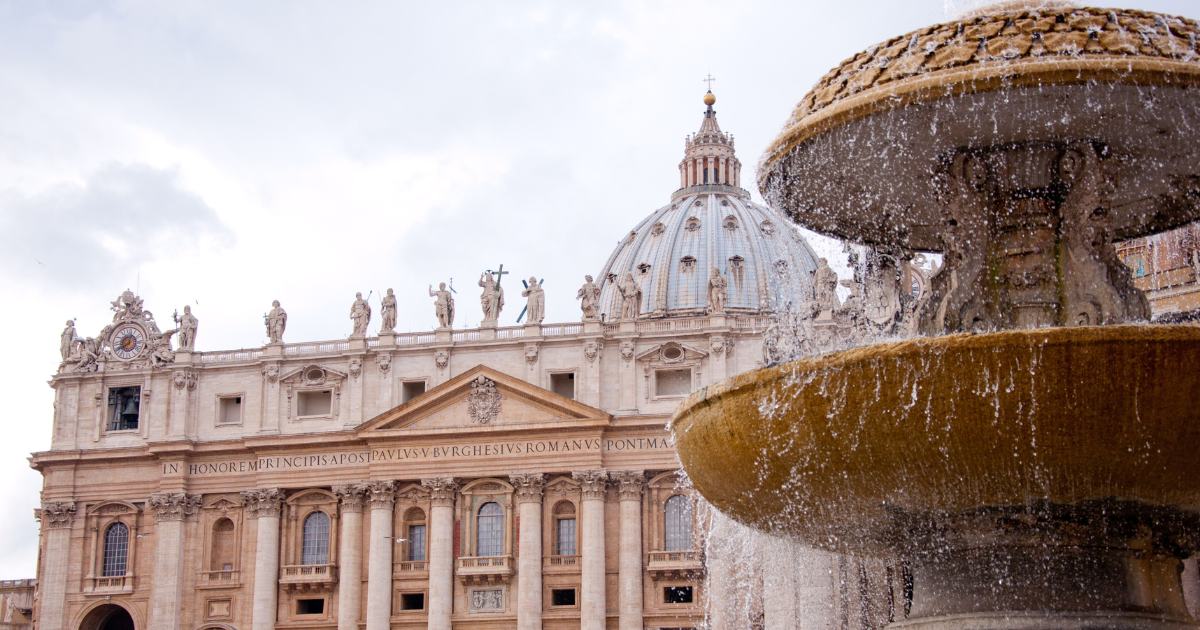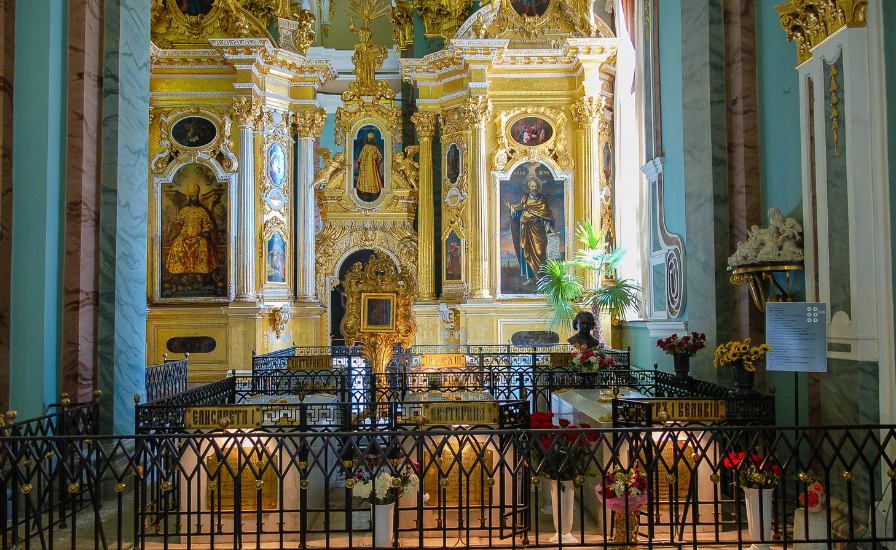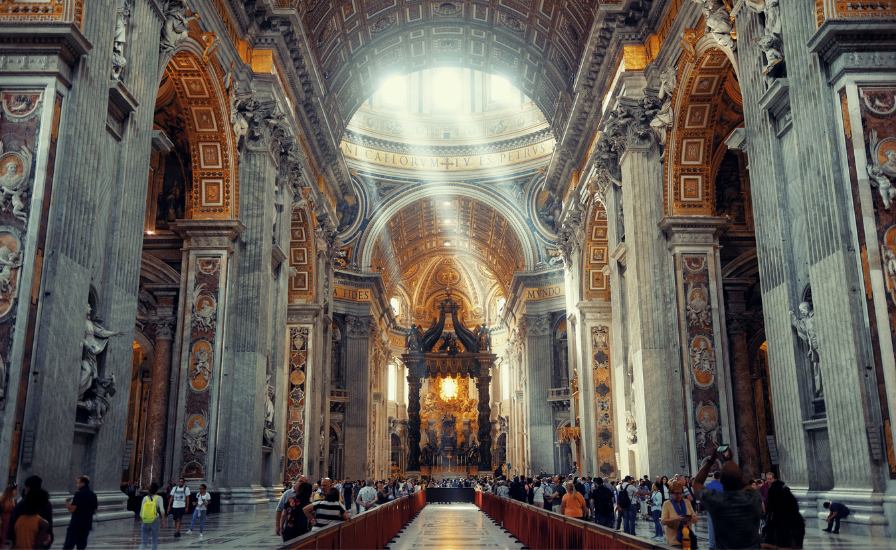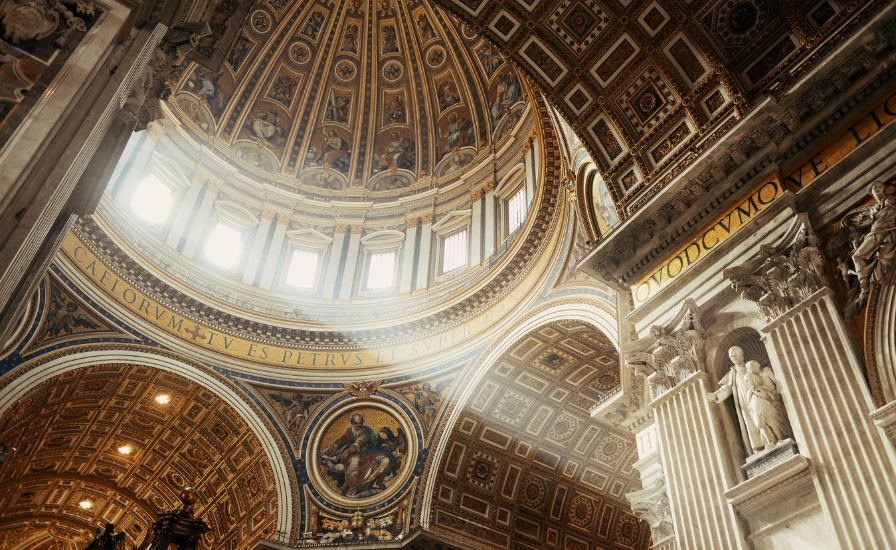6 Fascinating Insights into the Rich History of St. Peter’s Basilica.

Introduction
Explore the history and art of St. Peter’s Basilica with key insights and tips for visiting this iconic religious and architectural landmark.
Tools
Supplies
6 Fascinating Insights of St. Peter’s Basilica
St. Peter’s Basilica in Vatican City is not just a monument but a profound testament to faith, art, and history that continues to awe visitors from around the globe. This iconic basilica holds a place of prominence in Christianity, not only as a site of pilgrimage but as a piece of architectural mastery. From its grandiose design to the sacred artefacts it houses, every corner of this majestic site tells a story worth knowing. Here are six fascinating insights of St. Peter’s Basilica that will enhance your visit, whether you’re purchasing St. Peter’s Basilica dome tickets or planning a self-guided tour of St. Peter’s Basilica.
1. The Historical Edifice on St. Peter’s Tomb

The basilica stands atop a site of great significance—what is believed to be the tomb of St. Peter, one of Jesus Christ’s Apostles and the first Pope. Historical records suggest that Emperor Constantine, the first Christian emperor of Rome, ordered the construction of the original basilica in the 4th century AD. This decision was made to honor St. Peter’s martyrdom and mark his burial place. Over the centuries, the edifice underwent numerous transformations, leading to the grand structure we see today. This insight into St. Peter’s Basilica enriches the spiritual and historical significance of visiting.
2. Michelangelo and the Dome
One cannot discuss the insights of St. Peter’s Basilica without mentioning its iconic dome, designed by Michelangelo, who took over the basilica’s construction in 1547. At the age of 71, Michelangelo dedicated the last years of his life to this project, creating not only a symbol of the Renaissance but also an architectural feat that influenced church domes around the world. Visitors holding St. Peter’s Basilica dome tickets are privileged to see up close the interior of this magnificent dome, which stands as a testament to Michelangelo’s genius and a pivotal point in architectural history.
3. The Splendor of the Nave and the Baldachin

The nave of St. Peter’s Basilica, designed by Maderno, is a masterpiece of baroque architecture and stretches impressively, leading the eye towards the eminent Baldachin. Crafted by Gian Lorenzo Bernini, this towering canopy sits directly above the high altar, which itself is situated over St. Peter’s tomb. Bernini’s Baldachin, with its twisting columns and golden light, is not only a visual spectacle but also a symbolic structure that represents the embrace of the church. Exploring this area provides deep insights of St. Peter’s Basilica and its blend of spirituality and art.
4. Art and Apostles
St. Peter’s Basilica is as much a sanctuary for believers as it is a gallery for art enthusiasts. It houses an extensive collection of artworks by some of the most renowned masters from various periods. Among these treasures, one can find the Pietà by Michelangelo, located in the first chapel of the north aisle. This stunning sculpture of Mary holding the body of Christ is a profound representation of Renaissance sculpture. Artistic insights of St. Peter’s Basilica like this reflect not only religious devotion but also the deep-rooted cultural heritage of the Vatican.
5. The Vatican Grottoes and Necropolis
Beneath the radiant floors of the basilica lie the Vatican Grottoes, a series of chapels and tombs that house the remains of many popes. The atmosphere here is solemn and reflective, offering a more intimate glimpse into the church’s history. Deeper still is the Vatican Necropolis, where one can purportedly visit the Tomb of St. Peter. A self-guided tour of St. Peter’s Basilica that includes these underground treasures allows for a profound personal connection with the site’s layered histories.
6. The Experience of Ascending the Dome

For those adventurous enough to climb the dome, purchasing St. Peter’s Basilica dome tickets offers a unique experience. The ascent, which can be undertaken by elevator and a final set of stairs, provides a panoramic view of Rome from the highest dome in the world. As you climb, the interior beauty of the dome’s mosaics becomes increasingly intricate, a breathtaking insight of St. Peter’s Basilica that is both visually and spiritually uplifting.
Planning Your Visit
When planning your visit, consider booking St. Peter’s Basilica dome tickets in advance to avoid long lines, especially during peak tourist seasons. Also, a self-guided tour of St. Peter’s Basilica can be enriching, allowing you to explore at your own pace with an audio guide that provides context to the visual splendors you encounter.
Additional Tips for Visiting St. Peter’s Basilica

Dress Code Considerations: St. Peter’s Basilica enforces a strict dress code. Shoulders and knees must be covered for both men and women. It’s advisable to bring along a shawl or scarf to cover up appropriately when entering the sacred space.
Best Times to Visit: To avoid the crowds, consider visiting early in the morning or later in the afternoon. The basilica opens at 7 AM, making the first hour a relatively quiet time to explore. Additionally, Wednesday mornings may see larger crowds due to the Papal Audience, so plan accordingly.
Photography Rules: Photography is allowed in most areas of the basilica, but the use of flash is prohibited as it can damage ancient artworks. Always check for signs indicating any specific photography restrictions in certain areas.
Accessibility: St. Peter’s Basilica is accessible to wheelchair users and those with limited mobility. Elevators are available to access the dome, making it easier for everyone to enjoy the panoramic views of Rome.
Guided Tours: While a self-guided tour of St. Peter’s Basilica allows for flexibility, consider taking a guided tour for a more in-depth exploration. Guides can offer historical context and point out details that you might otherwise miss.
Fascinating Facts about St. Peter’s Basilica
A Site of Many ‘Firsts’: St. Peter’s Basilica was the first church to be built over a grave of a martyr—St. Peter himself. This tradition set a precedent for numerous other churches throughout Christendom.
An Architectural Collaboration: The basilica’s construction saw contributions from several of the greatest architects of the Renaissance and Baroque periods, including Bramante, Michelangelo, Raphael, and Bernini. This collaboration makes it a melting pot of artistic styles.
The Bronze of the Pantheon: The awe-inspiring Baldachin over the papal altar, crafted by Bernini, is made from bronze that was, according to legend, taken from the Pantheon. Pope Urban VIII ordered this, which led to the saying: “What the barbarians did not do, the Barberini did,” referring to his family name.
A Colossal Structure: The interior of St. Peter’s Basilica, which covers an area of 15,160 square meters, can accommodate over 60,000 people. It’s considered one of the largest churches in the world.
St. Peter’s Statue: A statue of St. Peter in the basilica has a foot worn down by centuries of pilgrims who have touched and kissed it, a testament to the basilica’s enduring significance in the Christian world.
The Five Doors: St. Peter’s has five large doors, with the central one, called the Holy Door, only opened during Holy Years (Jubilee years), which occur every 25 years. This door symbolizes a gateway to salvation.
By keeping these additional tips and fascinating facts in mind, visitors can enhance their experience and appreciation of St. Peter’s Basilica, making their visit both educational and spiritually enriching. Whether obtaining St. Peter’s Basilica dome tickets or planning a self-guided tour of St. Peter’s Basilica, these insights ensure a deeply memorable exploration of this historic site.
Conclusion
Every corner of St. Peter’s Basilica, from its soaring dome to its ancient grottoes, offers insights into centuries of religious tradition and artistic dedication. These insights of St. Peter’s Basilica not only provide a deeper understanding of its historical and spiritual significance but also enrich the overall experience, making every visit memorable. Whether you are a devout pilgrim or an art-loving tourist, St. Peter’s Basilica stands ready to reveal its treasures to those who seek them.